Contract Law Assignment: Analysis of Joan & Henry vs. Catapult RV's
VerifiedAdded on 2022/11/14
|10
|2370
|362
Case Study
AI Summary
This assignment analyzes a contract law case involving Joan and Henry Marsden, a retired couple, and Catapult RV's Pty Ltd, a motorhome dealership. The couple sought an off-road motorhome with low fuel consumption, and they were shown the Catapult Grand All-Terrain. However, the sales representative, Mark, misrepresented the vehicle's capabilities and fuel efficiency. The assignment examines whether Joan and Henry can cancel the contract due to breach of contract and misleading conduct under the Australian Consumer Law (ACL). It further investigates the damages the couple can claim, considering common law principles and ACL provisions. Finally, it assesses whether Joan and Henry can recover the advance payment for a trailer, given a subsequent verbal agreement. The analysis considers key legal concepts such as contractual terms, misrepresentation, breach of contract, damages, and the implications of the ACL. The conclusion supports the couple's right to cancel the contract and claim damages under both common law and the ACL.
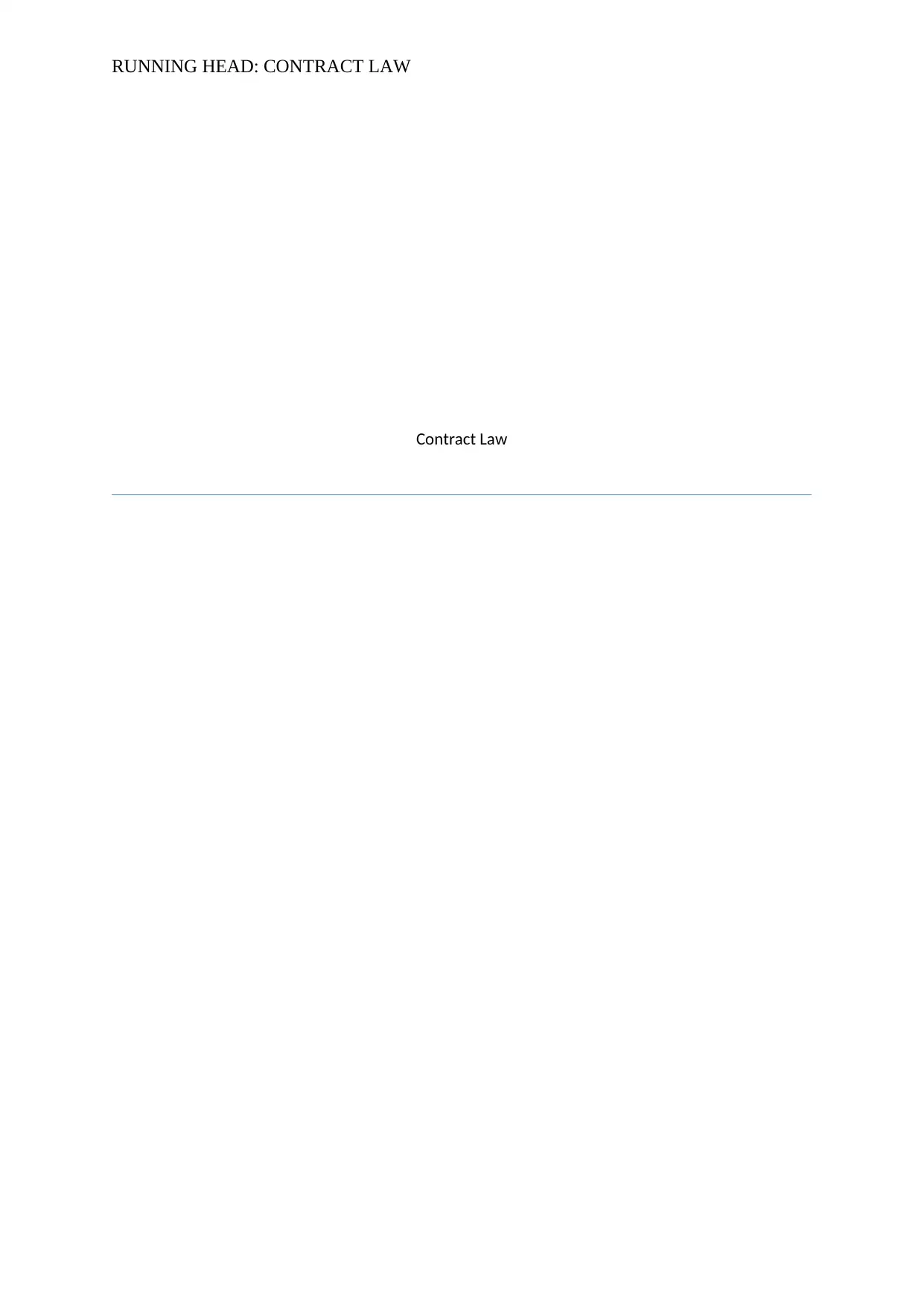
RUNNING HEAD: CONTRACT LAW
Contract Law
Contract Law
Paraphrase This Document
Need a fresh take? Get an instant paraphrase of this document with our AI Paraphraser
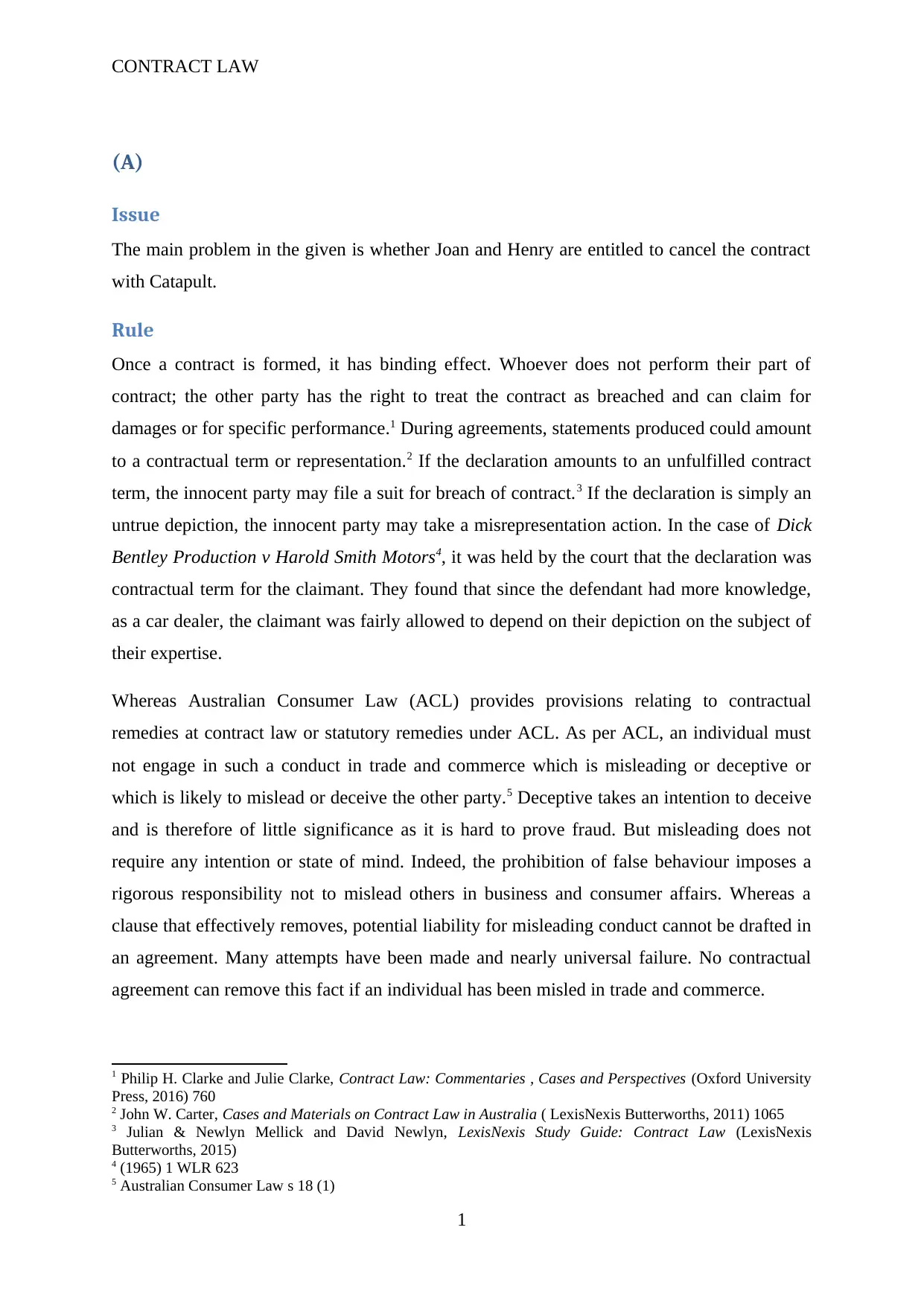
CONTRACT LAW
(A)
Issue
The main problem in the given is whether Joan and Henry are entitled to cancel the contract
with Catapult.
Rule
Once a contract is formed, it has binding effect. Whoever does not perform their part of
contract; the other party has the right to treat the contract as breached and can claim for
damages or for specific performance.1 During agreements, statements produced could amount
to a contractual term or representation.2 If the declaration amounts to an unfulfilled contract
term, the innocent party may file a suit for breach of contract.3 If the declaration is simply an
untrue depiction, the innocent party may take a misrepresentation action. In the case of Dick
Bentley Production v Harold Smith Motors4, it was held by the court that the declaration was
contractual term for the claimant. They found that since the defendant had more knowledge,
as a car dealer, the claimant was fairly allowed to depend on their depiction on the subject of
their expertise.
Whereas Australian Consumer Law (ACL) provides provisions relating to contractual
remedies at contract law or statutory remedies under ACL. As per ACL, an individual must
not engage in such a conduct in trade and commerce which is misleading or deceptive or
which is likely to mislead or deceive the other party.5 Deceptive takes an intention to deceive
and is therefore of little significance as it is hard to prove fraud. But misleading does not
require any intention or state of mind. Indeed, the prohibition of false behaviour imposes a
rigorous responsibility not to mislead others in business and consumer affairs. Whereas a
clause that effectively removes, potential liability for misleading conduct cannot be drafted in
an agreement. Many attempts have been made and nearly universal failure. No contractual
agreement can remove this fact if an individual has been misled in trade and commerce.
1 Philip H. Clarke and Julie Clarke, Contract Law: Commentaries , Cases and Perspectives (Oxford University
Press, 2016) 760
2 John W. Carter, Cases and Materials on Contract Law in Australia ( LexisNexis Butterworths, 2011) 1065
3 Julian & Newlyn Mellick and David Newlyn, LexisNexis Study Guide: Contract Law (LexisNexis
Butterworths, 2015)
4 (1965) 1 WLR 623
5 Australian Consumer Law s 18 (1)
1
(A)
Issue
The main problem in the given is whether Joan and Henry are entitled to cancel the contract
with Catapult.
Rule
Once a contract is formed, it has binding effect. Whoever does not perform their part of
contract; the other party has the right to treat the contract as breached and can claim for
damages or for specific performance.1 During agreements, statements produced could amount
to a contractual term or representation.2 If the declaration amounts to an unfulfilled contract
term, the innocent party may file a suit for breach of contract.3 If the declaration is simply an
untrue depiction, the innocent party may take a misrepresentation action. In the case of Dick
Bentley Production v Harold Smith Motors4, it was held by the court that the declaration was
contractual term for the claimant. They found that since the defendant had more knowledge,
as a car dealer, the claimant was fairly allowed to depend on their depiction on the subject of
their expertise.
Whereas Australian Consumer Law (ACL) provides provisions relating to contractual
remedies at contract law or statutory remedies under ACL. As per ACL, an individual must
not engage in such a conduct in trade and commerce which is misleading or deceptive or
which is likely to mislead or deceive the other party.5 Deceptive takes an intention to deceive
and is therefore of little significance as it is hard to prove fraud. But misleading does not
require any intention or state of mind. Indeed, the prohibition of false behaviour imposes a
rigorous responsibility not to mislead others in business and consumer affairs. Whereas a
clause that effectively removes, potential liability for misleading conduct cannot be drafted in
an agreement. Many attempts have been made and nearly universal failure. No contractual
agreement can remove this fact if an individual has been misled in trade and commerce.
1 Philip H. Clarke and Julie Clarke, Contract Law: Commentaries , Cases and Perspectives (Oxford University
Press, 2016) 760
2 John W. Carter, Cases and Materials on Contract Law in Australia ( LexisNexis Butterworths, 2011) 1065
3 Julian & Newlyn Mellick and David Newlyn, LexisNexis Study Guide: Contract Law (LexisNexis
Butterworths, 2015)
4 (1965) 1 WLR 623
5 Australian Consumer Law s 18 (1)
1
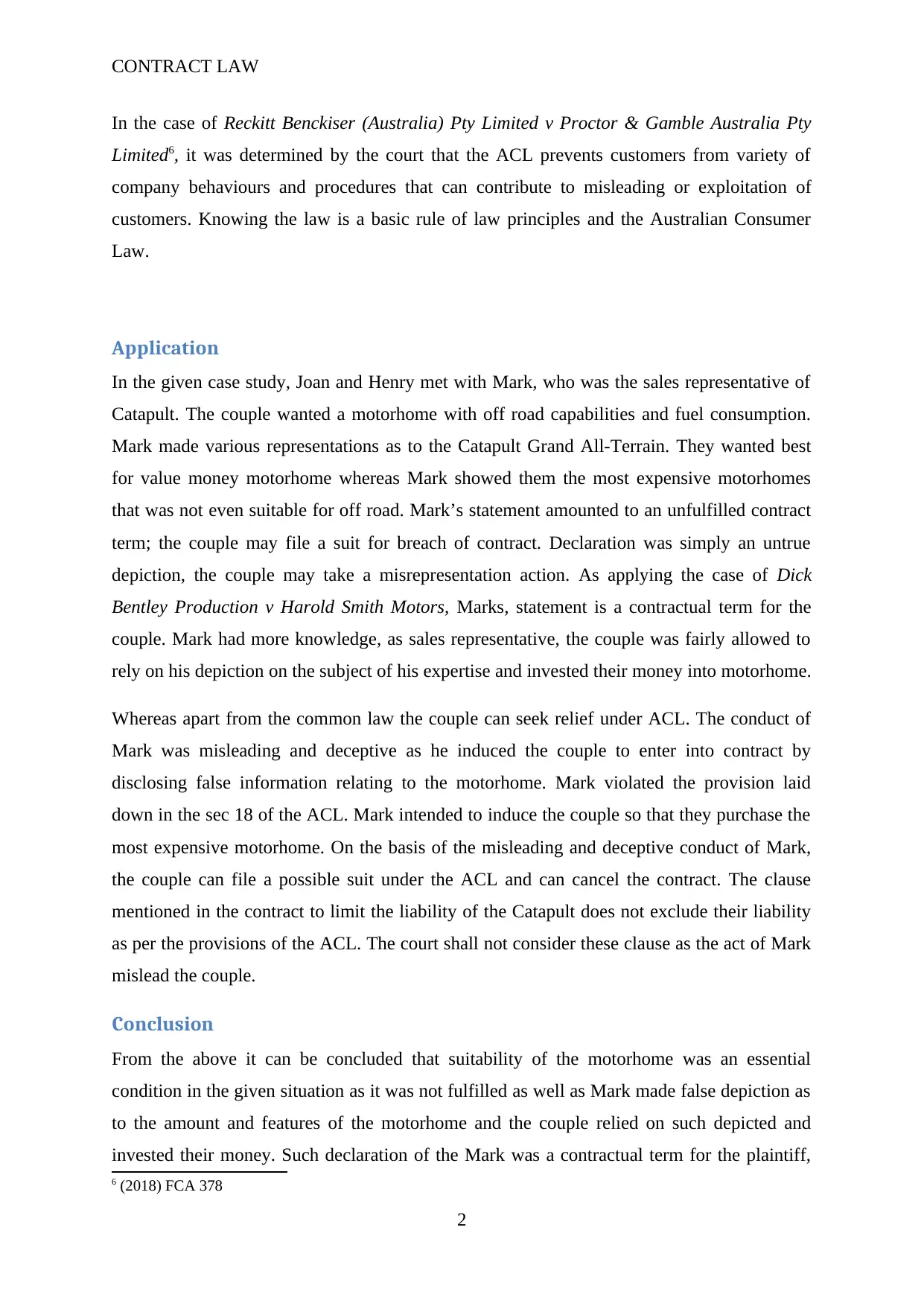
CONTRACT LAW
In the case of Reckitt Benckiser (Australia) Pty Limited v Proctor & Gamble Australia Pty
Limited6, it was determined by the court that the ACL prevents customers from variety of
company behaviours and procedures that can contribute to misleading or exploitation of
customers. Knowing the law is a basic rule of law principles and the Australian Consumer
Law.
Application
In the given case study, Joan and Henry met with Mark, who was the sales representative of
Catapult. The couple wanted a motorhome with off road capabilities and fuel consumption.
Mark made various representations as to the Catapult Grand All-Terrain. They wanted best
for value money motorhome whereas Mark showed them the most expensive motorhomes
that was not even suitable for off road. Mark’s statement amounted to an unfulfilled contract
term; the couple may file a suit for breach of contract. Declaration was simply an untrue
depiction, the couple may take a misrepresentation action. As applying the case of Dick
Bentley Production v Harold Smith Motors, Marks, statement is a contractual term for the
couple. Mark had more knowledge, as sales representative, the couple was fairly allowed to
rely on his depiction on the subject of his expertise and invested their money into motorhome.
Whereas apart from the common law the couple can seek relief under ACL. The conduct of
Mark was misleading and deceptive as he induced the couple to enter into contract by
disclosing false information relating to the motorhome. Mark violated the provision laid
down in the sec 18 of the ACL. Mark intended to induce the couple so that they purchase the
most expensive motorhome. On the basis of the misleading and deceptive conduct of Mark,
the couple can file a possible suit under the ACL and can cancel the contract. The clause
mentioned in the contract to limit the liability of the Catapult does not exclude their liability
as per the provisions of the ACL. The court shall not consider these clause as the act of Mark
mislead the couple.
Conclusion
From the above it can be concluded that suitability of the motorhome was an essential
condition in the given situation as it was not fulfilled as well as Mark made false depiction as
to the amount and features of the motorhome and the couple relied on such depicted and
invested their money. Such declaration of the Mark was a contractual term for the plaintiff,
6 (2018) FCA 378
2
In the case of Reckitt Benckiser (Australia) Pty Limited v Proctor & Gamble Australia Pty
Limited6, it was determined by the court that the ACL prevents customers from variety of
company behaviours and procedures that can contribute to misleading or exploitation of
customers. Knowing the law is a basic rule of law principles and the Australian Consumer
Law.
Application
In the given case study, Joan and Henry met with Mark, who was the sales representative of
Catapult. The couple wanted a motorhome with off road capabilities and fuel consumption.
Mark made various representations as to the Catapult Grand All-Terrain. They wanted best
for value money motorhome whereas Mark showed them the most expensive motorhomes
that was not even suitable for off road. Mark’s statement amounted to an unfulfilled contract
term; the couple may file a suit for breach of contract. Declaration was simply an untrue
depiction, the couple may take a misrepresentation action. As applying the case of Dick
Bentley Production v Harold Smith Motors, Marks, statement is a contractual term for the
couple. Mark had more knowledge, as sales representative, the couple was fairly allowed to
rely on his depiction on the subject of his expertise and invested their money into motorhome.
Whereas apart from the common law the couple can seek relief under ACL. The conduct of
Mark was misleading and deceptive as he induced the couple to enter into contract by
disclosing false information relating to the motorhome. Mark violated the provision laid
down in the sec 18 of the ACL. Mark intended to induce the couple so that they purchase the
most expensive motorhome. On the basis of the misleading and deceptive conduct of Mark,
the couple can file a possible suit under the ACL and can cancel the contract. The clause
mentioned in the contract to limit the liability of the Catapult does not exclude their liability
as per the provisions of the ACL. The court shall not consider these clause as the act of Mark
mislead the couple.
Conclusion
From the above it can be concluded that suitability of the motorhome was an essential
condition in the given situation as it was not fulfilled as well as Mark made false depiction as
to the amount and features of the motorhome and the couple relied on such depicted and
invested their money. Such declaration of the Mark was a contractual term for the plaintiff,
6 (2018) FCA 378
2
⊘ This is a preview!⊘
Do you want full access?
Subscribe today to unlock all pages.

Trusted by 1+ million students worldwide
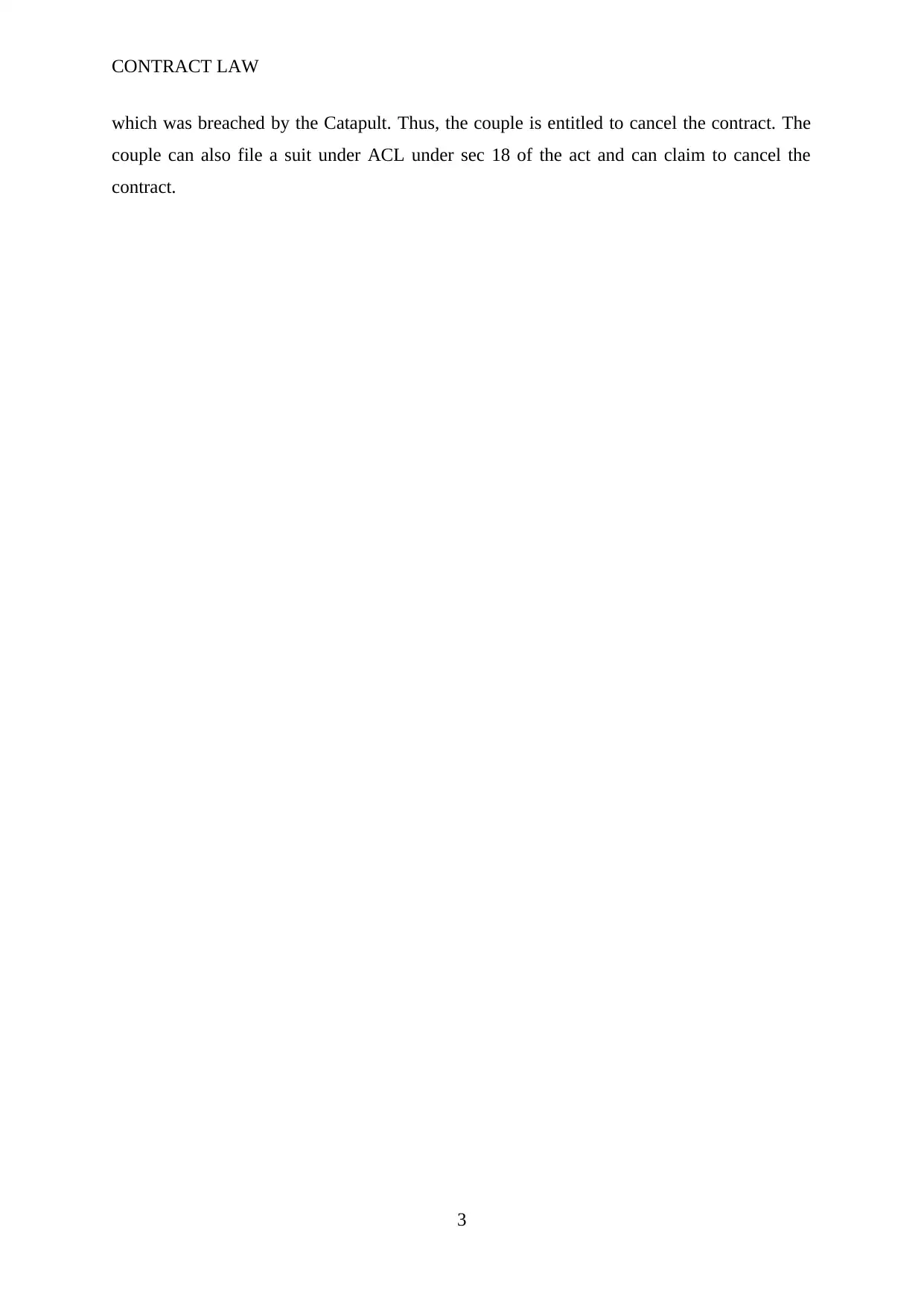
CONTRACT LAW
which was breached by the Catapult. Thus, the couple is entitled to cancel the contract. The
couple can also file a suit under ACL under sec 18 of the act and can claim to cancel the
contract.
3
which was breached by the Catapult. Thus, the couple is entitled to cancel the contract. The
couple can also file a suit under ACL under sec 18 of the act and can claim to cancel the
contract.
3
Paraphrase This Document
Need a fresh take? Get an instant paraphrase of this document with our AI Paraphraser
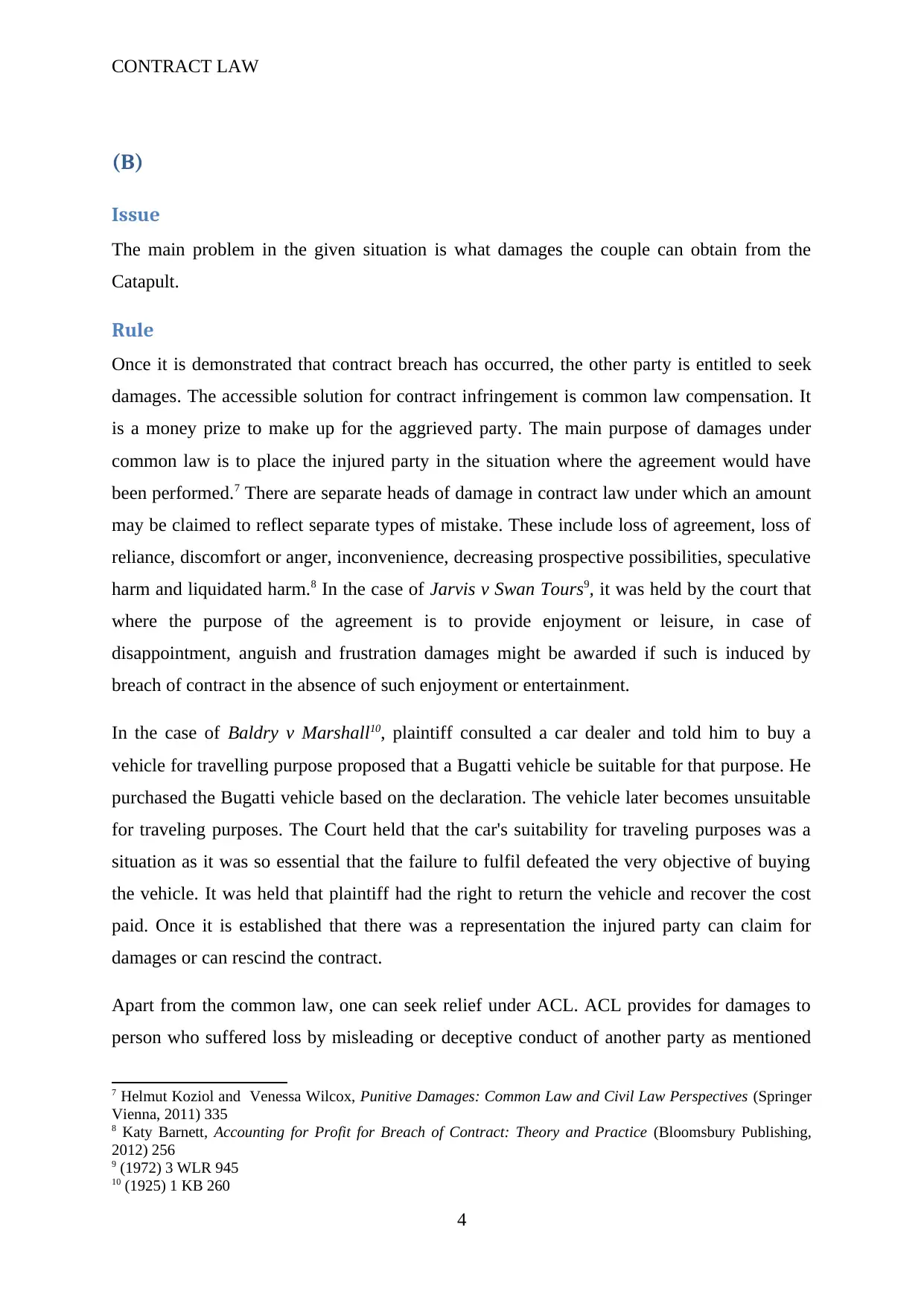
CONTRACT LAW
(B)
Issue
The main problem in the given situation is what damages the couple can obtain from the
Catapult.
Rule
Once it is demonstrated that contract breach has occurred, the other party is entitled to seek
damages. The accessible solution for contract infringement is common law compensation. It
is a money prize to make up for the aggrieved party. The main purpose of damages under
common law is to place the injured party in the situation where the agreement would have
been performed.7 There are separate heads of damage in contract law under which an amount
may be claimed to reflect separate types of mistake. These include loss of agreement, loss of
reliance, discomfort or anger, inconvenience, decreasing prospective possibilities, speculative
harm and liquidated harm.8 In the case of Jarvis v Swan Tours9, it was held by the court that
where the purpose of the agreement is to provide enjoyment or leisure, in case of
disappointment, anguish and frustration damages might be awarded if such is induced by
breach of contract in the absence of such enjoyment or entertainment.
In the case of Baldry v Marshall10, plaintiff consulted a car dealer and told him to buy a
vehicle for travelling purpose proposed that a Bugatti vehicle be suitable for that purpose. He
purchased the Bugatti vehicle based on the declaration. The vehicle later becomes unsuitable
for traveling purposes. The Court held that the car's suitability for traveling purposes was a
situation as it was so essential that the failure to fulfil defeated the very objective of buying
the vehicle. It was held that plaintiff had the right to return the vehicle and recover the cost
paid. Once it is established that there was a representation the injured party can claim for
damages or can rescind the contract.
Apart from the common law, one can seek relief under ACL. ACL provides for damages to
person who suffered loss by misleading or deceptive conduct of another party as mentioned
7 Helmut Koziol and Venessa Wilcox, Punitive Damages: Common Law and Civil Law Perspectives (Springer
Vienna, 2011) 335
8 Katy Barnett, Accounting for Profit for Breach of Contract: Theory and Practice (Bloomsbury Publishing,
2012) 256
9 (1972) 3 WLR 945
10 (1925) 1 KB 260
4
(B)
Issue
The main problem in the given situation is what damages the couple can obtain from the
Catapult.
Rule
Once it is demonstrated that contract breach has occurred, the other party is entitled to seek
damages. The accessible solution for contract infringement is common law compensation. It
is a money prize to make up for the aggrieved party. The main purpose of damages under
common law is to place the injured party in the situation where the agreement would have
been performed.7 There are separate heads of damage in contract law under which an amount
may be claimed to reflect separate types of mistake. These include loss of agreement, loss of
reliance, discomfort or anger, inconvenience, decreasing prospective possibilities, speculative
harm and liquidated harm.8 In the case of Jarvis v Swan Tours9, it was held by the court that
where the purpose of the agreement is to provide enjoyment or leisure, in case of
disappointment, anguish and frustration damages might be awarded if such is induced by
breach of contract in the absence of such enjoyment or entertainment.
In the case of Baldry v Marshall10, plaintiff consulted a car dealer and told him to buy a
vehicle for travelling purpose proposed that a Bugatti vehicle be suitable for that purpose. He
purchased the Bugatti vehicle based on the declaration. The vehicle later becomes unsuitable
for traveling purposes. The Court held that the car's suitability for traveling purposes was a
situation as it was so essential that the failure to fulfil defeated the very objective of buying
the vehicle. It was held that plaintiff had the right to return the vehicle and recover the cost
paid. Once it is established that there was a representation the injured party can claim for
damages or can rescind the contract.
Apart from the common law, one can seek relief under ACL. ACL provides for damages to
person who suffered loss by misleading or deceptive conduct of another party as mentioned
7 Helmut Koziol and Venessa Wilcox, Punitive Damages: Common Law and Civil Law Perspectives (Springer
Vienna, 2011) 335
8 Katy Barnett, Accounting for Profit for Breach of Contract: Theory and Practice (Bloomsbury Publishing,
2012) 256
9 (1972) 3 WLR 945
10 (1925) 1 KB 260
4
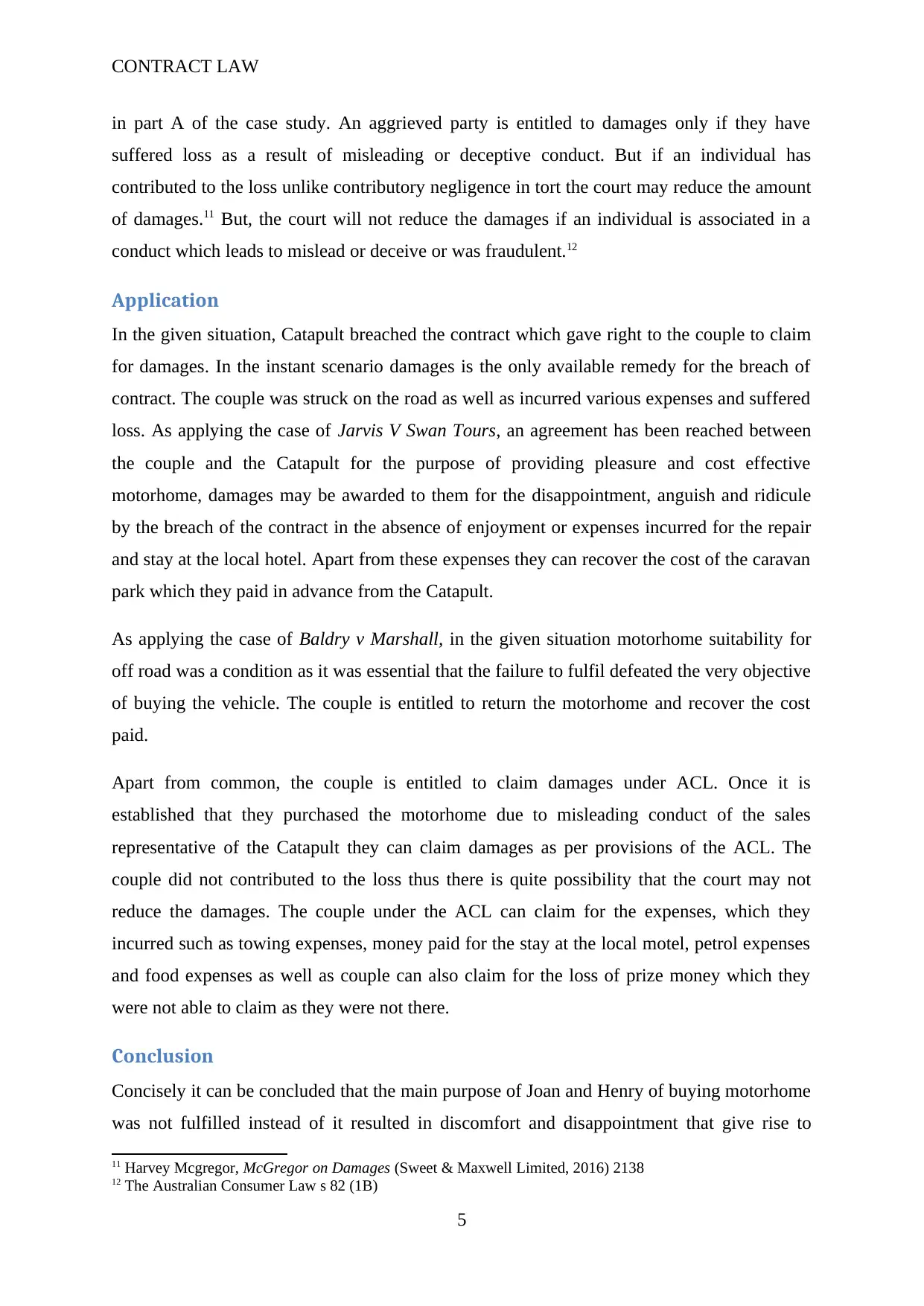
CONTRACT LAW
in part A of the case study. An aggrieved party is entitled to damages only if they have
suffered loss as a result of misleading or deceptive conduct. But if an individual has
contributed to the loss unlike contributory negligence in tort the court may reduce the amount
of damages.11 But, the court will not reduce the damages if an individual is associated in a
conduct which leads to mislead or deceive or was fraudulent.12
Application
In the given situation, Catapult breached the contract which gave right to the couple to claim
for damages. In the instant scenario damages is the only available remedy for the breach of
contract. The couple was struck on the road as well as incurred various expenses and suffered
loss. As applying the case of Jarvis V Swan Tours, an agreement has been reached between
the couple and the Catapult for the purpose of providing pleasure and cost effective
motorhome, damages may be awarded to them for the disappointment, anguish and ridicule
by the breach of the contract in the absence of enjoyment or expenses incurred for the repair
and stay at the local hotel. Apart from these expenses they can recover the cost of the caravan
park which they paid in advance from the Catapult.
As applying the case of Baldry v Marshall, in the given situation motorhome suitability for
off road was a condition as it was essential that the failure to fulfil defeated the very objective
of buying the vehicle. The couple is entitled to return the motorhome and recover the cost
paid.
Apart from common, the couple is entitled to claim damages under ACL. Once it is
established that they purchased the motorhome due to misleading conduct of the sales
representative of the Catapult they can claim damages as per provisions of the ACL. The
couple did not contributed to the loss thus there is quite possibility that the court may not
reduce the damages. The couple under the ACL can claim for the expenses, which they
incurred such as towing expenses, money paid for the stay at the local motel, petrol expenses
and food expenses as well as couple can also claim for the loss of prize money which they
were not able to claim as they were not there.
Conclusion
Concisely it can be concluded that the main purpose of Joan and Henry of buying motorhome
was not fulfilled instead of it resulted in discomfort and disappointment that give rise to
11 Harvey Mcgregor, McGregor on Damages (Sweet & Maxwell Limited, 2016) 2138
12 The Australian Consumer Law s 82 (1B)
5
in part A of the case study. An aggrieved party is entitled to damages only if they have
suffered loss as a result of misleading or deceptive conduct. But if an individual has
contributed to the loss unlike contributory negligence in tort the court may reduce the amount
of damages.11 But, the court will not reduce the damages if an individual is associated in a
conduct which leads to mislead or deceive or was fraudulent.12
Application
In the given situation, Catapult breached the contract which gave right to the couple to claim
for damages. In the instant scenario damages is the only available remedy for the breach of
contract. The couple was struck on the road as well as incurred various expenses and suffered
loss. As applying the case of Jarvis V Swan Tours, an agreement has been reached between
the couple and the Catapult for the purpose of providing pleasure and cost effective
motorhome, damages may be awarded to them for the disappointment, anguish and ridicule
by the breach of the contract in the absence of enjoyment or expenses incurred for the repair
and stay at the local hotel. Apart from these expenses they can recover the cost of the caravan
park which they paid in advance from the Catapult.
As applying the case of Baldry v Marshall, in the given situation motorhome suitability for
off road was a condition as it was essential that the failure to fulfil defeated the very objective
of buying the vehicle. The couple is entitled to return the motorhome and recover the cost
paid.
Apart from common, the couple is entitled to claim damages under ACL. Once it is
established that they purchased the motorhome due to misleading conduct of the sales
representative of the Catapult they can claim damages as per provisions of the ACL. The
couple did not contributed to the loss thus there is quite possibility that the court may not
reduce the damages. The couple under the ACL can claim for the expenses, which they
incurred such as towing expenses, money paid for the stay at the local motel, petrol expenses
and food expenses as well as couple can also claim for the loss of prize money which they
were not able to claim as they were not there.
Conclusion
Concisely it can be concluded that the main purpose of Joan and Henry of buying motorhome
was not fulfilled instead of it resulted in discomfort and disappointment that give rise to
11 Harvey Mcgregor, McGregor on Damages (Sweet & Maxwell Limited, 2016) 2138
12 The Australian Consumer Law s 82 (1B)
5
⊘ This is a preview!⊘
Do you want full access?
Subscribe today to unlock all pages.

Trusted by 1+ million students worldwide
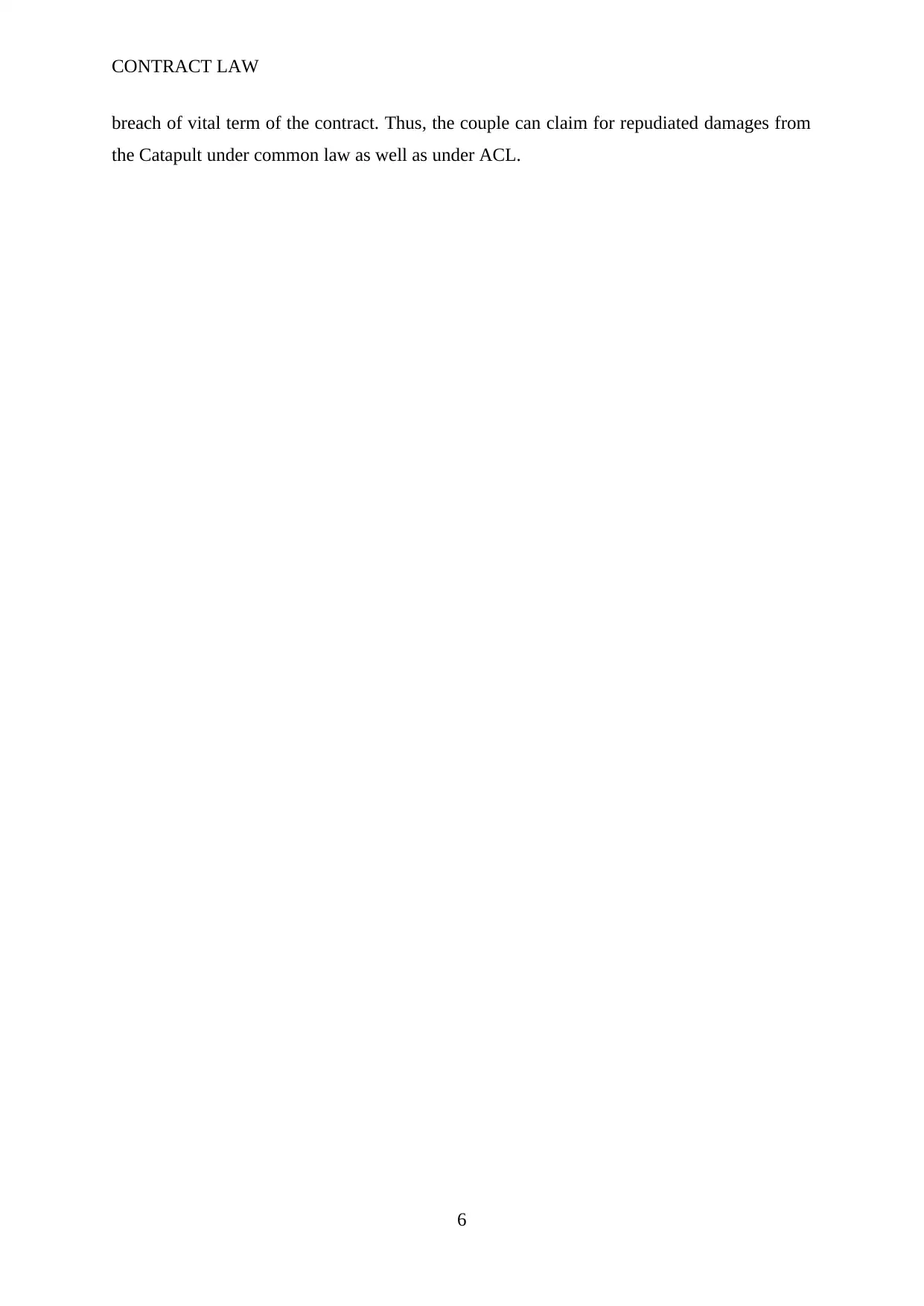
CONTRACT LAW
breach of vital term of the contract. Thus, the couple can claim for repudiated damages from
the Catapult under common law as well as under ACL.
6
breach of vital term of the contract. Thus, the couple can claim for repudiated damages from
the Catapult under common law as well as under ACL.
6
Paraphrase This Document
Need a fresh take? Get an instant paraphrase of this document with our AI Paraphraser
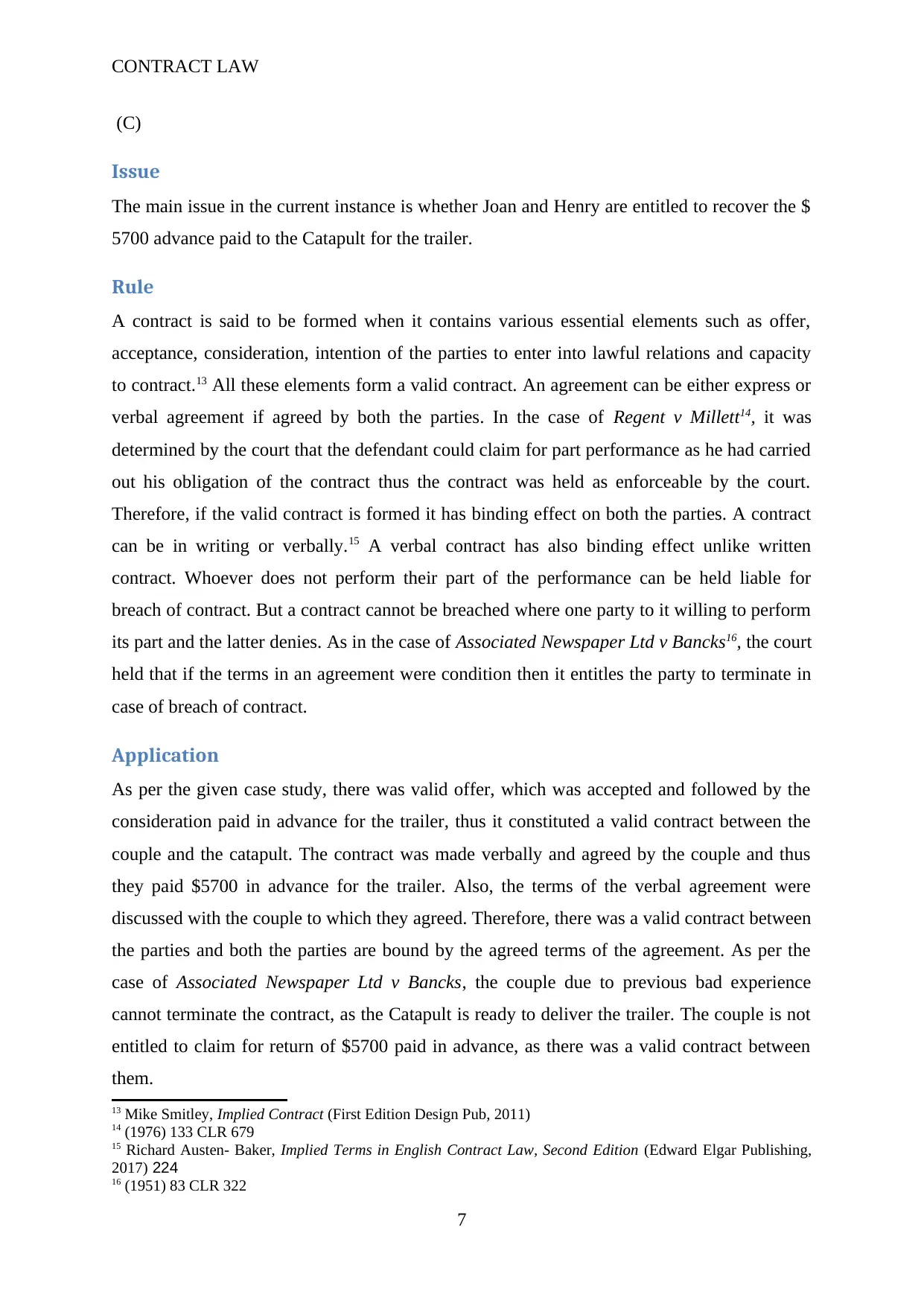
CONTRACT LAW
(C)
Issue
The main issue in the current instance is whether Joan and Henry are entitled to recover the $
5700 advance paid to the Catapult for the trailer.
Rule
A contract is said to be formed when it contains various essential elements such as offer,
acceptance, consideration, intention of the parties to enter into lawful relations and capacity
to contract.13 All these elements form a valid contract. An agreement can be either express or
verbal agreement if agreed by both the parties. In the case of Regent v Millett14, it was
determined by the court that the defendant could claim for part performance as he had carried
out his obligation of the contract thus the contract was held as enforceable by the court.
Therefore, if the valid contract is formed it has binding effect on both the parties. A contract
can be in writing or verbally.15 A verbal contract has also binding effect unlike written
contract. Whoever does not perform their part of the performance can be held liable for
breach of contract. But a contract cannot be breached where one party to it willing to perform
its part and the latter denies. As in the case of Associated Newspaper Ltd v Bancks16, the court
held that if the terms in an agreement were condition then it entitles the party to terminate in
case of breach of contract.
Application
As per the given case study, there was valid offer, which was accepted and followed by the
consideration paid in advance for the trailer, thus it constituted a valid contract between the
couple and the catapult. The contract was made verbally and agreed by the couple and thus
they paid $5700 in advance for the trailer. Also, the terms of the verbal agreement were
discussed with the couple to which they agreed. Therefore, there was a valid contract between
the parties and both the parties are bound by the agreed terms of the agreement. As per the
case of Associated Newspaper Ltd v Bancks, the couple due to previous bad experience
cannot terminate the contract, as the Catapult is ready to deliver the trailer. The couple is not
entitled to claim for return of $5700 paid in advance, as there was a valid contract between
them.
13 Mike Smitley, Implied Contract (First Edition Design Pub, 2011)
14 (1976) 133 CLR 679
15 Richard Austen- Baker, Implied Terms in English Contract Law, Second Edition (Edward Elgar Publishing,
2017) 224
16 (1951) 83 CLR 322
7
(C)
Issue
The main issue in the current instance is whether Joan and Henry are entitled to recover the $
5700 advance paid to the Catapult for the trailer.
Rule
A contract is said to be formed when it contains various essential elements such as offer,
acceptance, consideration, intention of the parties to enter into lawful relations and capacity
to contract.13 All these elements form a valid contract. An agreement can be either express or
verbal agreement if agreed by both the parties. In the case of Regent v Millett14, it was
determined by the court that the defendant could claim for part performance as he had carried
out his obligation of the contract thus the contract was held as enforceable by the court.
Therefore, if the valid contract is formed it has binding effect on both the parties. A contract
can be in writing or verbally.15 A verbal contract has also binding effect unlike written
contract. Whoever does not perform their part of the performance can be held liable for
breach of contract. But a contract cannot be breached where one party to it willing to perform
its part and the latter denies. As in the case of Associated Newspaper Ltd v Bancks16, the court
held that if the terms in an agreement were condition then it entitles the party to terminate in
case of breach of contract.
Application
As per the given case study, there was valid offer, which was accepted and followed by the
consideration paid in advance for the trailer, thus it constituted a valid contract between the
couple and the catapult. The contract was made verbally and agreed by the couple and thus
they paid $5700 in advance for the trailer. Also, the terms of the verbal agreement were
discussed with the couple to which they agreed. Therefore, there was a valid contract between
the parties and both the parties are bound by the agreed terms of the agreement. As per the
case of Associated Newspaper Ltd v Bancks, the couple due to previous bad experience
cannot terminate the contract, as the Catapult is ready to deliver the trailer. The couple is not
entitled to claim for return of $5700 paid in advance, as there was a valid contract between
them.
13 Mike Smitley, Implied Contract (First Edition Design Pub, 2011)
14 (1976) 133 CLR 679
15 Richard Austen- Baker, Implied Terms in English Contract Law, Second Edition (Edward Elgar Publishing,
2017) 224
16 (1951) 83 CLR 322
7
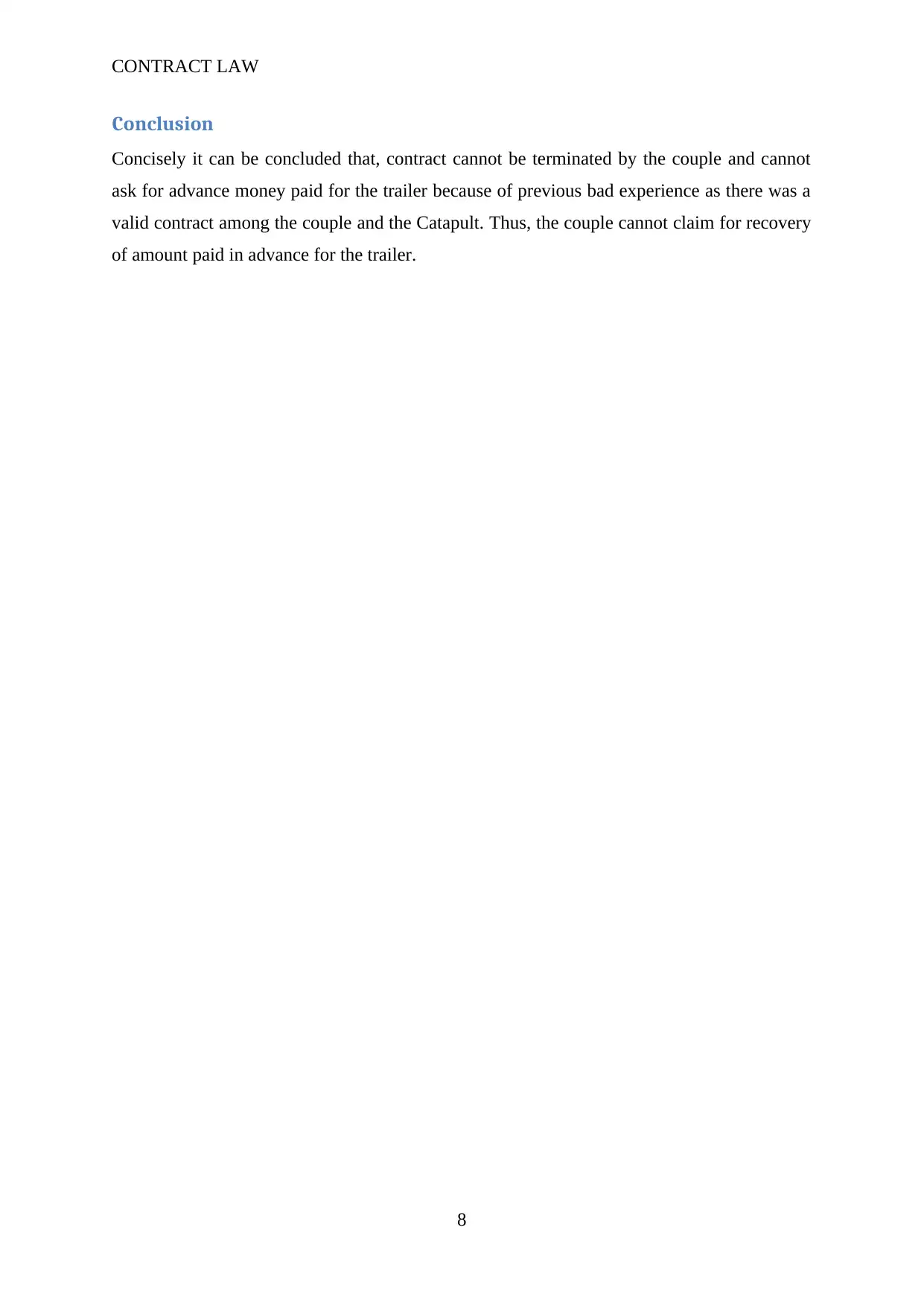
CONTRACT LAW
Conclusion
Concisely it can be concluded that, contract cannot be terminated by the couple and cannot
ask for advance money paid for the trailer because of previous bad experience as there was a
valid contract among the couple and the Catapult. Thus, the couple cannot claim for recovery
of amount paid in advance for the trailer.
8
Conclusion
Concisely it can be concluded that, contract cannot be terminated by the couple and cannot
ask for advance money paid for the trailer because of previous bad experience as there was a
valid contract among the couple and the Catapult. Thus, the couple cannot claim for recovery
of amount paid in advance for the trailer.
8
⊘ This is a preview!⊘
Do you want full access?
Subscribe today to unlock all pages.

Trusted by 1+ million students worldwide
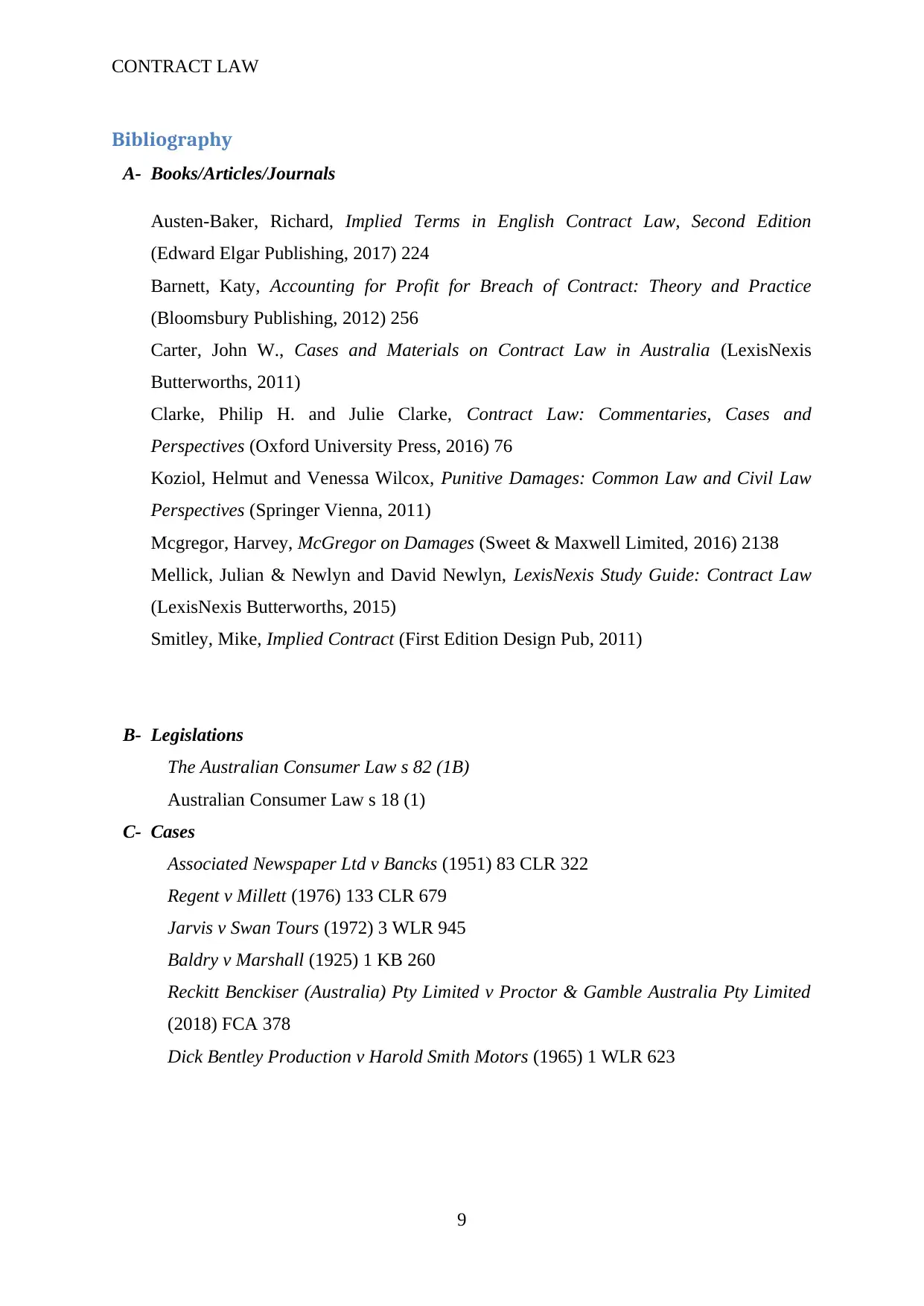
CONTRACT LAW
Bibliography
A- Books/Articles/Journals
Austen-Baker, Richard, Implied Terms in English Contract Law, Second Edition
(Edward Elgar Publishing, 2017) 224
Barnett, Katy, Accounting for Profit for Breach of Contract: Theory and Practice
(Bloomsbury Publishing, 2012) 256
Carter, John W., Cases and Materials on Contract Law in Australia (LexisNexis
Butterworths, 2011)
Clarke, Philip H. and Julie Clarke, Contract Law: Commentaries, Cases and
Perspectives (Oxford University Press, 2016) 76
Koziol, Helmut and Venessa Wilcox, Punitive Damages: Common Law and Civil Law
Perspectives (Springer Vienna, 2011)
Mcgregor, Harvey, McGregor on Damages (Sweet & Maxwell Limited, 2016) 2138
Mellick, Julian & Newlyn and David Newlyn, LexisNexis Study Guide: Contract Law
(LexisNexis Butterworths, 2015)
Smitley, Mike, Implied Contract (First Edition Design Pub, 2011)
B- Legislations
The Australian Consumer Law s 82 (1B)
Australian Consumer Law s 18 (1)
C- Cases
Associated Newspaper Ltd v Bancks (1951) 83 CLR 322
Regent v Millett (1976) 133 CLR 679
Jarvis v Swan Tours (1972) 3 WLR 945
Baldry v Marshall (1925) 1 KB 260
Reckitt Benckiser (Australia) Pty Limited v Proctor & Gamble Australia Pty Limited
(2018) FCA 378
Dick Bentley Production v Harold Smith Motors (1965) 1 WLR 623
9
Bibliography
A- Books/Articles/Journals
Austen-Baker, Richard, Implied Terms in English Contract Law, Second Edition
(Edward Elgar Publishing, 2017) 224
Barnett, Katy, Accounting for Profit for Breach of Contract: Theory and Practice
(Bloomsbury Publishing, 2012) 256
Carter, John W., Cases and Materials on Contract Law in Australia (LexisNexis
Butterworths, 2011)
Clarke, Philip H. and Julie Clarke, Contract Law: Commentaries, Cases and
Perspectives (Oxford University Press, 2016) 76
Koziol, Helmut and Venessa Wilcox, Punitive Damages: Common Law and Civil Law
Perspectives (Springer Vienna, 2011)
Mcgregor, Harvey, McGregor on Damages (Sweet & Maxwell Limited, 2016) 2138
Mellick, Julian & Newlyn and David Newlyn, LexisNexis Study Guide: Contract Law
(LexisNexis Butterworths, 2015)
Smitley, Mike, Implied Contract (First Edition Design Pub, 2011)
B- Legislations
The Australian Consumer Law s 82 (1B)
Australian Consumer Law s 18 (1)
C- Cases
Associated Newspaper Ltd v Bancks (1951) 83 CLR 322
Regent v Millett (1976) 133 CLR 679
Jarvis v Swan Tours (1972) 3 WLR 945
Baldry v Marshall (1925) 1 KB 260
Reckitt Benckiser (Australia) Pty Limited v Proctor & Gamble Australia Pty Limited
(2018) FCA 378
Dick Bentley Production v Harold Smith Motors (1965) 1 WLR 623
9
1 out of 10
Your All-in-One AI-Powered Toolkit for Academic Success.
+13062052269
info@desklib.com
Available 24*7 on WhatsApp / Email
![[object Object]](/_next/static/media/star-bottom.7253800d.svg)
Unlock your academic potential
Copyright © 2020–2026 A2Z Services. All Rights Reserved. Developed and managed by ZUCOL.

